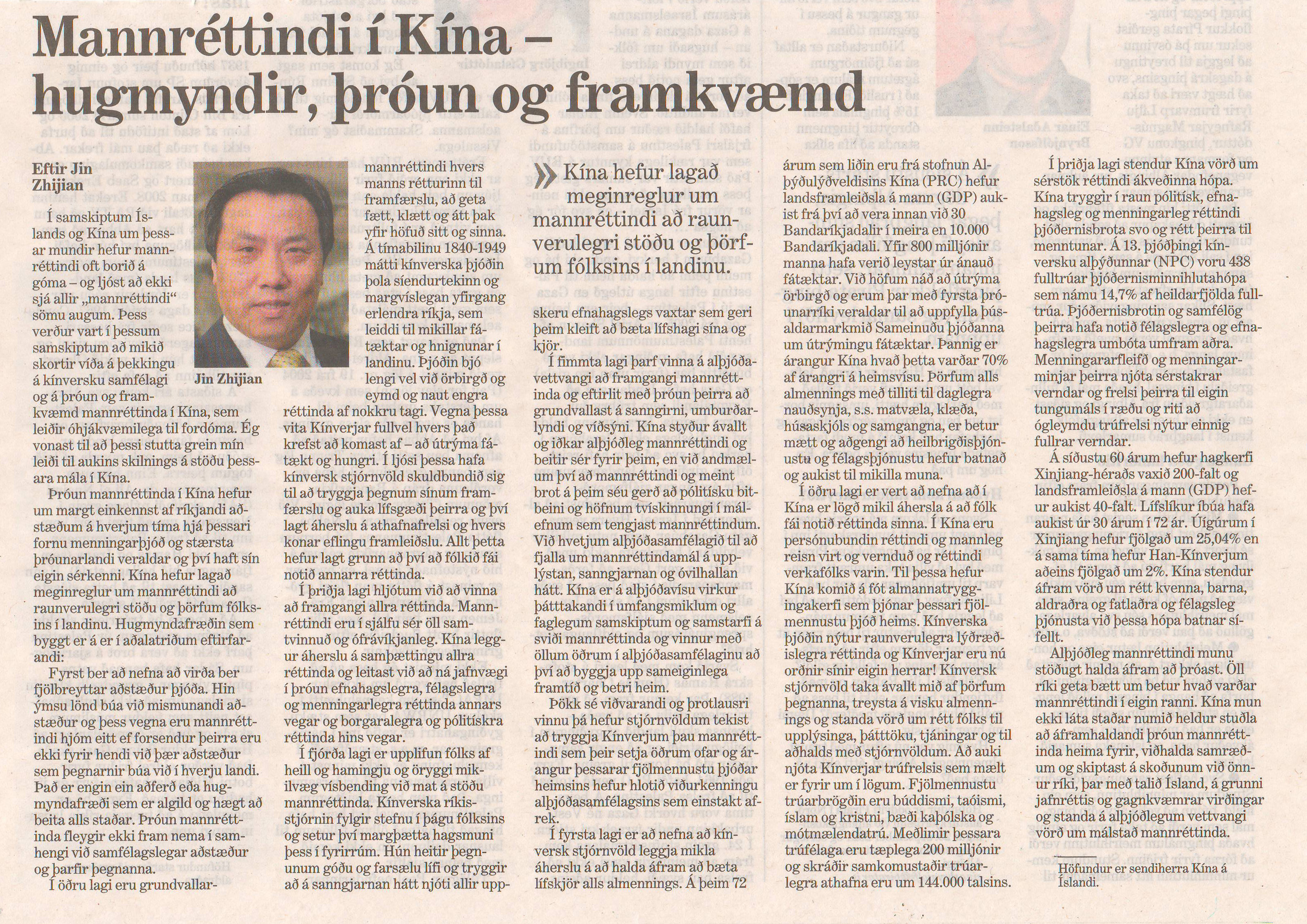
On June 21, the famous Icelandic newspaper Morgunblaðið published a signed article by Ambassador Jin Zhijian entitled "China's Proposals and Practices on Human Rights".
The full text is as follows:
"Human rights" is an issue mentioned frequently between China and Iceland these days, and the two sides have different views on this matter. Many Icelandic friends don't know much about China's proposals and practices on human rights, leading to their prejudice against China's human rights record. I hope my brief introduction to this topic may be conducive to your better understanding of China in this regard.
As a nation with ancient civilization and the largest developing country worldwide, China's proposals and practices on human rights have its own characteristics. China has combined universal principles with the prevailing realities of the country, forming concepts of human rights with a people-centered approach.
These concepts include: First, we should respect diversity in developing human rights. As various countries have different national conditions, human rights can only be effectively ensured by combining universal principles with the prevailing realities of different countries. There is no universally applicable path and model, and human rights can only be advanced in the context of national conditions and people's needs.
Second, the rights to subsistence and development are the primary rights. From 1840 to 1949, China suffered repeated foreign aggression and fell into poverty and backwardness. Living in misery, the Chinese people enjoyed utterly no right of any kind. Therefore, the people know very well what survival requires-no poverty and no hunger. Prioritizing people's rights to subsistence and development, China has committed to liberating and developing productive forces, eliminating poverty, and enhancing its level of development. All this has laid the foundation for fulfilling the various rights of the people.
Third, we should make an overall progress in all rights. All human rights are interdependent and inalienable. China coordinates the planning of all rights and endeavors to achieve a balanced development between economic, social and cultural rights and civil and political rights.
Fourth, people's sense of gain, happiness and security is an important criterion for evaluating human rights. The Chinese government upholds the people-centered approach, prioritizes the people's interests before anything else, and promises a good life for the people, ensuring that the fruits of development offer greater benefits to all the people in a fair way, and enabling every person to enjoy opportunities for self-development and a good life.
Fifth, fairness, being reasonable and inclusiveness are the basic principles of international human rights governance. China is always a supporter, practitioner and promoter of international human rights. We oppose politicizing human rights or applying double standards in matters related to human rights, and encourage the international community to address human rights issues in a fair, objective and non-selective manner. China is engaged in extensive, in-depth international exchanges, dialogue and cooperation concerning human rights, and works with the rest of the world to build a global community of shared future and a beautiful world.
Thanks to sustained and unremitting efforts, China has successfully blazed a development path of human rights that suits its national conditions, and has achieved world-renowned achievements.
First, China makes great efforts in continuing to improve people's living standards. Over the past 72 years since the founding of the PRC, China's per capita GDP has risen from less than U.S.$30 to over U.S.$10,000. More than 800 million people have been lifted out of poverty. We have eliminated abject poverty for the first time in China's history, becoming the first developing country to realize one of the UN Millennium Development Goals for poverty reduction, and contributing over 70 percent to the world's poverty reduction. People's need for daily necessities such as clothing, food, housing and transportation is better met, and their rights to health as well as social assistance have been significantly improved.
Second, China effectively ensures that people enjoy their rights. In China, personal rights and dignity are well respected and protected, and workers' rights are fully safeguarded. Hence, China has established a social security system that covers the largest population in the world. The Chinese people enjoy real democracy and they become the masters of their own country. The Chinese government always solicits people's needs, relies on their wisdom, and protects people's rights to know, to participate, to express, and to supervise. Besides, China protects freedom of religious belief in accordance with the law. The major religions practiced in China are Buddhism, Taoism, Islam, Catholicism and Protestant Christianity, with nearly 200 million believers and about 144,000 places of worship registered for religious activities.
Third, China protects the rights of special groups. China effectively guarantees the political, economic, educational and cultural rights of ethnic minorities. The 13th National People's Congress has 438 deputies from ethnic minority groups, accounting for 14.7 percent of the total number of deputies. The ethnic minorities and ethnic minority areas have leapfrogged in social and economic development. Cultural heritage and relics of ethnic minorities are effectively protected, and their freedom to use and develop their own spoken and written languages as well as freedom of religious belief are also fully protected.
Over the past 60 years, Xinjiang's economy grew by more than 200 times, its per capita GDP increased by nearly 40 times, and residents' life expectancy rose from 30 to 72 years. The growth rate of the Uyghurs in Xinjiang increased by 25.04%, much higher than that of the Han population, which is 2%. China has also continued to protect the rights of women, children, the elderly, and people with disabilities. The social security system for these people is also improving.
The development of international human rights will keep going on without an end. Every country has room for improvement in human rights. China will continue to promote the development of its own human rights, conduct dialogues and exchanges with various countries including Iceland on the basis of equality and mutual respect, and advance the international cause of human rights.
Jin Zhijian
Chinese Ambassador to Iceland